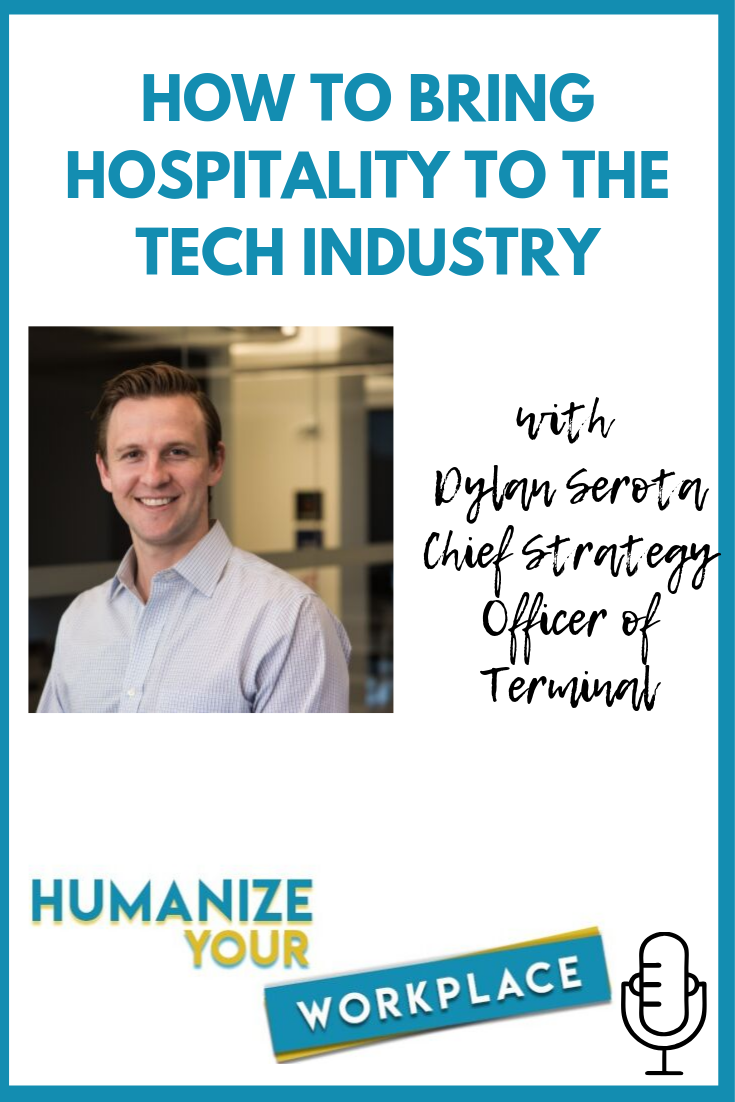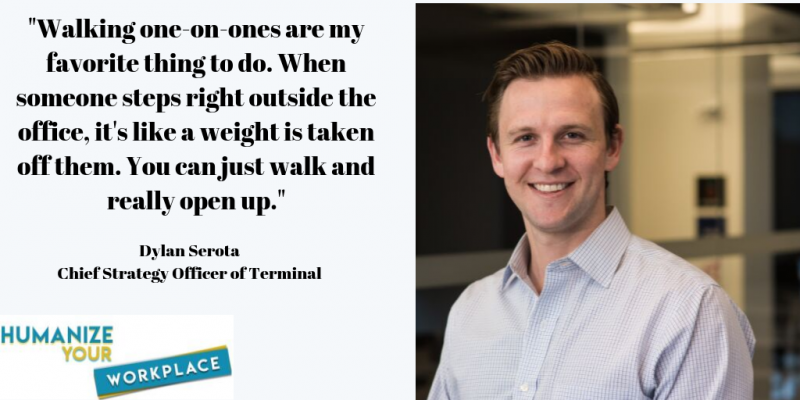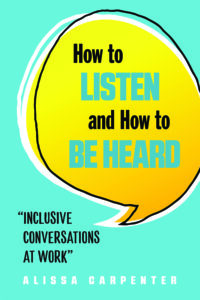-
The benefits of working for a startup
-
Interviewing techniques to personalize the process for each candidate
-
How to bring hospitality into the tech industry
-
Why it’s important for businesses to get involved in the community
To listen to this week’s episode, head over to Google Podcasts, Spotify, Apple Podcasts, or Stitcher, check it out below.
What person would you like to thank for having a positive influence on who you are professionally today and why?
There are so many people that I am grateful for, but if there is one person, I would probably have to say my mom. She always taught me how to deal with people and how to treat them with respect. She has also gone through a very interesting professional career from social work and then to teaching. I think imparting that always learning, always teaching mentality had one of the more profound impacts on how I approach work.
You have had some interesting experiences in your previous role at Eventbrite and current position as a Founder. Can you share with us how these experiences have really shaped the way you work with other people?
Probably for someone my age, I worked in a very limited amount of companies. I think I’m probably one of the rare professionals in San Francisco that worked at one company for seven years. But that company brought me a ton of experience across different teams and types of experiences in a company.
I think one thing that really sticks out to me joining Eventbrite at 21 was being part of a fast growing start up. I didn’t expect to have this much responsibility put on my shoulders at such a young age with such little experience.
I was thrust into this position of being put on a hiring panel and I only interviewed at one company to get the job. Now suddenly, I was put in this position to determine someone else’s fate. I didn’t feel like I was prepared or really had the experience to make such a big decision on behalf of someone else.
I found someone at the company that I respected and shared my concern and I continue to use their advice today. He suggested to reverse how I looked at the resume by starting to ask questions from the bottom, where people bury their interests and passions. That’s the best way to really connect with someone. Get them to open up about what they really are interested in, what they’ve done probably throughout their life; is it dance; is it sports; is it travel; a random hobby that you might happen to share with them. Then allow that to bridge the gap into the decisions that they’ve made over their career.
That model of how to read a resume from the bottom up really stuck with me and made me feel confident being able to go into an interview. At the end of the day, maybe I can’t judge their experiences, but I can at least connect with them as a human.
Are you working on any kind of exciting and interesting projects right now?
We are trying to map out holistically that end-to-end member experience by converting ourselves to the mentality of a hospitality company. When I take a step back and think about some of the brands that make you feel great and comfortable, I think of a lot of travel brands or restaurants and hospitality. When you think about the workplace, you’re at work so many hours a day with different people, with people who are trying to support and help you.
What we’re working on right now is to really think about what are the extra ways that we can go above and beyond. Just like when you check in at the hotel, they’re thinking about what is that check-in experience. What is it when you walk into your room, check out, and when you call and ask for something what’s the response time?
We’re trying to now think about how we can actually up level and enhance the idea of bringing a hospitality approach to the workplace. And we’ve hired people with that experience to be part of our team. I’m excited about some of the work that we’re doing there and the effect that it’s going to have on our members and their day to day experience with Terminal.
How can professionals at any level enhance the culture and bring value to the organization?
I think for people who want to enhance the culture of the workplace the idea is to bring your whole self to the workplace. Let me explain a little bit more about what that means: Early on at Eventbrite I was lucky enough to meet my now wife and we worked together for several years.
And it’s so interesting as we started dating later on, she said I was a completely different than when she first met me. I asked her what she meant, and she said that she felt like she met “work Dylan” and then she got to know the “real Dylan.” And it kind of struck me that I was coming to work and as my professional self and I was thinking so much about how everyone was going to perceive me. Overall what my wife made me wake up and realize I really wasn’t being real and wasn’t letting people in, and therefore I wasn’t really contributing to the culture because I wasn’t bringing the unique qualities that make me-me into the workplace.
It was a good wake-up call especially at starting Terminal to really spend the time and understand it’s okay to be human. As a leader there’s that interesting balance where you don’t want to appear vulnerable, but you want to be human. And that balance I think is also interesting as you try to strike that with your employees. But overall, I’ve seen just being able to be yourself and be comfortable with that then it allows other people to be comfortable. The more you can bring your whole self to work, the better.
I’d love to hear more about cultural inclusivity within the work that you do. You talk a lot about hosting different diverse groups; Women of the World and LGBTQA+. Can you tell us a little bit more about what this looks like?
One of the best aspects about Terminal is the opportunity to connect with our communities. We’re helping growing technology companies that are facing this ‘war for talent’ in areas like San Francisco or New York where you have the big giant tech companies swooping up everyone. We’re helping them move into markets that have ample supply of talent and grow their teams.
By doing that we’re creating these campuses. These campuses are great for hosting these teams and being a workplace, but they’re also great for being a community center of sorts in these areas. And that’s something we focused on; one because we want to be an additive member of our community where we operate; but two I think it is around cultural inclusivity and our commitment to hosting events and providing the space.
We have concerts, LGBTQ meetups, and ladies learning code on the weekends. We invite the use our space which is located very centrally in some of the best tech hubs across North America and South America. It allows us to give back to the community through organizations that align well to our values and our members to provide their time if they want to participate these organizations. And one of the biggest things is signaling the fact that we’re an inclusive organization and it sends a strong signal both to our members and our employees.
It’s one thing to put something up on your values and it’s another to actually give up your time, your space, your money and in many ways to align yourself with those organizations. Frankly, it’s not something that we intend to be an ROI positive, but we’ve seen through these events people discover Terminal and then come to us for jobs. So, it has been impactful to us to do that outside from I think in the intrinsic value that we believe we see.
If you had only 15 minutes to get to know people within your organization and community, what would you do?
I’m not one for sitting down for long periods of times and standing up at a standing desk or a booth. But my favorite thing to do if I have 15 minutes is to go for walks. I’m lucky in San Francisco our offices have beautiful view of the bay and the Golden Gate Bridge and there’s great walking paths. And when I go up to some of our other campuses whether in Toronto Montreal, Vancouver I just love to get outside and bring people on walks.
Walking one-on-ones are my favorite thing to do. When someone steps right outside the office, it’s like a weight is taken off them. You can just walk and really open up. It’s these small little things that I think totally change the approach in terms of how someone’s going to talk, what topics they’re going to bring up and I always find that that’s my favorite way to connect with someone.
- Cultivating Relationships - July 20, 2021
- Empowering Our People - July 13, 2021
- Finding Purpose - July 6, 2021





